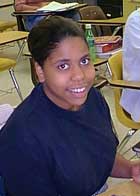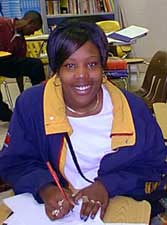Major Works
- The Big Blues
- Teaseling to California
- Born Under a Bad sign
- Live Wire/ Blues Power
- Albert King Does the King Thing
- I’ll Play the Blues for You
- Truckload of Lovin’
- Albert
- New Orleans Heat
- The Pinch
- Master Works
- Blues for Elvis
- San Francisco ‘83
- I’m in a Phone Booth, Baby
- I Wanna Get Funky
- Blues at Sunrise
- Door to Door
- Laundromat Blues
- Watt Stax
- Years Gone By
Stax Records
Born Under a Bad Sign, 1967
Live Wire/Blues Power, 1968
Albert King does the King Thing, 1968
I play the Blues for You, 1972
The Pinch, 1978
Blues for Elvis, 1983
I wanna get Funky, 1987
Blues at Sunrise, 1988
Watt Stax
Years Gone By
Utopia Records
Truckload of Lovin’, 1976
Albert, 1977
Fantasy Records
San Francisco ’83, 1983
I’m in a Phone Booth Baby, 1984
The Lost Session, 1986
Albert King: A Biography
by Bonita Garner (SHS)

Bonita Garner (SHS)
Albert King (Albert Nelson) was born on the 25 of April 1923 (some sources say 1924) in Indianola, Mississippi. King is the son of Mary Blevins, a church singer, and the stepson of Will Nelson, an itinerant preacher (LaBlanc 120). King moved from Mississippi to Osceola, Arkansas, where he grew up on a farm (Swell and Dwight 329).
King is a self-taught guitar player who learned how to play on his one string “diddley-bow” (Tour Part 1). At the age of six, King had only a cigar box guitar. Twelve years later King got his first real guitar, which only cost him one dollar and twenty-five cents. King had a unique playing style. He played upside-down, so it was harder for him to learn his chords. In spite of this, King kept on doing his thing. He was also strongly influenced by Elmore James, Robert Nighthawk, and Howlin’ Wolf . (LaBanc 119).
When King felt that he played well enough, he performed with the Yancey’s Band, but he kept his day job as a bulldozer driver. In addition to his performing with the Yancey’s Band, he sat in with the the Grove Boys. Afterwards he moved to South Bend, Indiana, and sang with the Harmony Boys. He next went to Chicago, where he got an offer to play for Bluesman Jimmy Reed as well as Brook Benton and Jackie Wilson (LaBlanc 119).
King talked the Parrot label owner Al Benson into recording his songs. Some of his singles on this label were Bad Luck Blues and Be on Your Merry Way. King made little money ($14), so he left the label. Six years later King signed with the Bobbin and King labels. With these labels, he had over a dozen singles released. The song Don’t Throw Your Love on Me So Strong, became number fourteen on the top twenty blues hit list. He also had a minor hit I’m a Lonely Man. King stayed with this label from 1959-1962. However, he also left this label because he was under paid ($800). King’s biggest success came when he signed with Stax Records. He had a lot of records produced and worked with many people. He became a major blues figure at this time (Albert King-1). Many people such as Eric Clapton, Peter Green, and the late Mike Bloomfield tried to figure out the secret to King’s playing style. “He can take four notes and write a volume,” Bloomfield said to guitar players (LaBlanc 120). When King left Stax Records, he signed with Utopia Records. Here his songs Truckload of Lovin’ and Albert were produced. King made the best move for his career when he signed with the Fantasy label. San Francisco ‘83 and I’m in A Phone Booth, Baby are two blues classics released while with them. (LaBlanc 120). King performed at the Filmore West Concert in 1968, where King stole the show. After this performance King was named “The most-imitated blues guitarist in the world.” (Historical Tour Part 1).
King was one of the first Rhythm and Blues singers to play with a symphony. He recorded with the St. Louis Symphony and brought together blues and classical music (Albert King-2). Albert King also performed on Sunday, January 28, 1973, at Jackson, Mississippi’s white First Baptist Church, where several (Black) people were not allowed to attend the Sunday worship, including the wife of the white civil rights attorney Frank Parken (Swell and Dwight 329).
In 1983, Albert King was inducted into the W. C. Handy International Blues Awards Hall of Fame (LaBlanc 120). King won two Grammy-nominated songs: San Francisco ‘83 and I’m in A Phone Booth Baby. Both nominations were in 1984 (LaBlanc 121). He was also inducted into the Blues Foundation Hall of Fame in 1983. (Albert King, 2).
King died of a heart attack on December 21, 1992. Many musicians and fans mourned his death across the country (The Ultimate C…). Even though King was sometimes looked over because of the similarity of his name to B. B. King’s, he was a great performer. King proved his greatness with hard work and many accomplishments. One critic has said of him: King was “one of the most influential blues guitarist ever. One of the three Kings of the electric blues guitar.” (Morgan 1) Another said, “Albert King was one of the players who defined post -World War II electric blues.” (The ultimate C…)
Albert King: A Biography
by Courtney Rice (SHS)

Courtney Rice (SHS)
Albert King was one of the most influential and talented, blues musicians of all time. Albert King (Albert Nelson) was born on April 25, 1923, (1924 some sources vary) in Indianola, Mississippi, he but resided in Oseola, Arkansas. As a child King taught himself how to play on a homemade guitar. This left-handed guitar pudgy played his instrument up side down. Later, King created a guitar from a cigar box. Then King became known as the “Velvet Bulldozer”. During the 1940’s King played the guitar with Yancy’s Band and the Groove Boys. As a result of this King got his first taste of the recording industry in 1953 with Parrot owner, Al Benson. King’s first top hit was ‘Walking from Door to Door’ and ‘Lonesome in my Bed’, which sold over thirty-five thousand copies. King signed with Stax Records in 1966. In 1968, King was offered a lucrative sum of sixteen thousand by a concert promoter Bill Graham. Meanwhile King left Stax Records and then signed with Utopia Records where he got over produced and cheated out his money. Lastly King signed with Fantasy Label.
King did not receive many awards. The only known one was induction into W.C. Handy International Blues Awards Hall of Fame in 1983 (Lablanc, 119-121). “Although it has been over five years since King’s last album, his sound has been kept alive through constant touring” (Stone, Contemporary Musicians, Volume Two). However, before King’s next tour, he died in Memphis, Tennessee, in 1992, of a heart attack (Larkin, 2309). Albert King was called “the most-imitated blues guitarist in the world” (http://www.st-louis.mo.us/st-louis/walkofame/inductees/king.html).
Timeline
- 1923 (or 1924): April 23: Albert King was born in Indianola, Mississippi.
- 1941: King purchased his first six-string guitar from a friend for only one dollar and twenty-five cents.
- 1940’s: Albert King worked as a bulldozer driver. King played guitar with Yancy’s Band and the In the Grove Boys; he was a singer with the gospel group The Harmony Boys; he also worked as a drummer for Jimmy Reed, Brook Benton, and Jackie Wilson.
- early 1950’s: King worked with a group called the Groove Boys before migrating north and ending up in Gary, Indiana.
- 1953: First songs recorded Walking From Door to Door, Lonesome in My Bed, and Bad Luck Blues with record company Parrot by Al Benson
- 1956: King moved to Lovejoy, Illinois
- 1959: Had a minor hit on Bobbin with ‘I’m a Lonely Man’
- 1959-1962: Over a dozen singles were released on the Bobbin and King labels.
- 1961: Don’t Throw Your Love on Me so Strong was a Top Twenty Rhythm and Blues hit
- 1966: King signed with Stax Records
- 1967: Born Under a Bad Sign was his debut album with Stax.
- 1968: Performed at the San Francisco Filmore West. He opened for John Mayal and Jimmy Hendrix.
- 1969: King became the first blues guitarist to perform with a symphony. He also took night classes in music theory.
- 1970’s: Played to rock and soul crowds
- 1974: King left Stax Records
- 1983: After a five-year recording drought King signed with the Fantasy label. He got two Grammy nominations and was inducted into the W. C. Handy International Blues Awards Hall of Fame.
- 1990: King was a guest on guitarist Gary Moore’s ‘back-to-the-roots collection’
- 1983-1992: King recorded many songs.
- 1992: King died of a heart attack in Memphis, TN, before he was to go on tour in Europe
Related Websites
- 100 Greatest Guitarists: Albert King #13 (RollingStone, 2015)
- Mississippi Blues Trail Marker for Albert King
Bibliography
- Albert King Historical Tour Part 1. http://www.st- louis.mo.us/st-louis/walkofame/inductees/king.html. April 24,1998.
- Albert King. http://www.blueflamecafe.com/Albert_King.html. April 24,1998.
- Erlewine, Daniel. “All Music Guide”. Volume 1. n. pag.
- Feature Artist- Albert King: The Ultimate C. http://www.rhino.com/features/71268.html. April 24,1998.
- Lablanc, Michael. Contemporary Musicians. Volume 2. 1990. 119-121.
- LaBlanc, Michael L. Contemporary Musicians. Vol. 6. United States, 1990.
- Larkin, Colin. The Guinness Encyclopedia of Popular Music. New York: Stockton Press, 1990.
- Larkin, Colin. “Popular Music”. The Guinness Encyclopedia. 1995. Volume 3. 2308-2309.
- Morgan, John. http://www.hub.org/bluesnet/artist/albert.king.html.
- Stone, Calen D. Contemporary Musicians. December 1989. Volume 2.
- Swell, George A. and Margaret L. Dwight. United States, 1984
